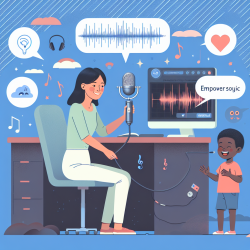Introduction
In the ever-evolving landscape of speech therapy, practitioners are constantly seeking ways to enhance their methods and improve outcomes for children. The recent research article titled "Neuronal and behavioral affective perceptions of human and naturalness-reduced emotional prosodies" offers valuable insights into how synthesized speech can be optimized for emotional understanding. This blog explores the implications of this research for speech-language pathologists and how they can apply these findings to their practice.
The Significance of Emotional Prosody
Emotional prosody, the rhythm, stress, and intonation of speech, plays a crucial role in conveying emotions. In children, understanding and interpreting these emotional cues is vital for social interaction and emotional development. The study by Duville et al. (2022) highlights the differences in emotional perception between human and synthesized voices, emphasizing the importance of naturalness in emotional prosody.
Key Findings from the Research
- Naturalness and Intelligibility: The study found that as the naturalness of synthesized speech decreases, so does the intelligibility and emotional recognition. This suggests that maintaining naturalness in synthesized speech is critical for effective communication.
- Valence and Arousal: Despite the reduction in naturalness, perceptions of valence (the intrinsic attractiveness or averseness) and arousal (the physiological and psychological state of being awoken) were preserved. This indicates that even less natural voices can convey basic emotional states.
- Neurophysiological Correlates: The research utilized EEG to assess the brain's response to different levels of naturalness in speech, revealing that emotional integration is modulated but not eliminated by synthetization.
Implications for Practitioners
For speech-language pathologists, these findings underscore the importance of using high-quality, natural-sounding synthesized speech in therapy sessions. Here are some practical applications:
- Enhancing Emotional Recognition: Use synthesized voices that closely mimic natural human speech to improve children's ability to recognize and respond to emotional cues.
- Customizing Therapy Tools: Collaborate with technology developers to create speech synthesis tools that prioritize naturalness and emotional prosody.
- Ongoing Research: Encourage further research into the nuances of emotional prosody in synthesized speech to continually refine therapeutic approaches.
Conclusion
Incorporating the latest research into practice can significantly enhance the effectiveness of speech therapy for children. By focusing on the naturalness of synthesized speech, practitioners can improve emotional recognition and communication skills in their young clients. To read the original research paper, please follow this link: Neuronal and behavioral affective perceptions of human and naturalness-reduced emotional prosodies.










